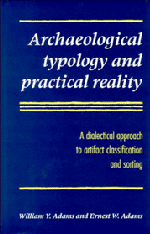 Archaeological Typology and Practical Reality
Archaeological Typology and Practical Reality Book contents
- Frontmatter
- Contents
- List of figures
- List of tables
- The archaeologist's preface
- The philosopher's preface
- PART I Introductory
- PART II The nature of types and typologies
- PART III Typology in action: the Medieval Nubian Pottery Typology
- PART IV Pragmatics of archaeological typology
- PART V Classification, explanation, and theory
- Appendices
- References
- Index
The philosopher's preface
Published online by Cambridge University Press: 23 November 2009
- Frontmatter
- Contents
- List of figures
- List of tables
- The archaeologist's preface
- The philosopher's preface
- PART I Introductory
- PART II The nature of types and typologies
- PART III Typology in action: the Medieval Nubian Pottery Typology
- PART IV Pragmatics of archaeological typology
- PART V Classification, explanation, and theory
- Appendices
- References
- Index
Summary
I (identified in subsequent chapters as EWA) received a BS in electrical engineering and a PhD in philosophy, with a minor in mathematics, at Stanford University. I have been a Fellow of the Behavioral Models Project at Columbia University, Instructor at Wesleyan University, and Professor of Philosophy at the University of California, Berkeley. Aside from philosophy of science I have published papers on mathematical psychology, decision theory, theory of probability, and probabilistic aspects of logic, including a book, The Logic of Conditionals, an Application of Probability to Deductive Logic (EWA 1975). In philosophy of science I have studied and written on induction and confirmation, causation, scientific concept formation, theory of measurement, and the foundations of physical topology and geometry, on which I am presently writing a book.
A word should be said about my philosophical development in relation to the present work. My initial orientation was toward the highly abstract and formalistic approach of the logical positivists (empiricists) and their allies, such as Rudolf Carnap, Carl Hempel, and Karl Popper. This approach dominated the philosophy of science in the 1940s and 1950s, and my early work, especially on measurement, was in that tradition. However, my faith in positivism was shaken by the criticisms of Thomas Kuhn (1962), though I did not accept the Kuhnian historicist position (the “dialectic of scientific paradigms”) that came to succeed positivism as the dominant trend in the philosophy of science in the 1960s and 1970s.
- Type
- Chapter
- Information
- Archaeological Typology and Practical RealityA Dialectical Approach to Artifact Classification and Sorting, pp. xxii - xxivPublisher: Cambridge University PressPrint publication year: 1991


